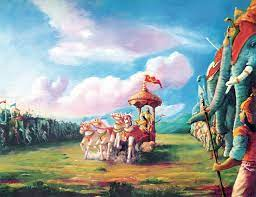I had always resonated with Arjuna's sorrow, but now, more than ever before, as I watch what is unfolding in Ukraine, that scripture from aeons ago seems to speak not only to the present, but reawakens the sorrow within me for generations past of my own family.
I am a child of survivors of the Shoah. Some 77 years ago, my parents were liberated by Russian soldiers from German concentration camps. After trying to resettle in their homes in Poland, they eventually made their way to the American zone of Germany where United Nations Relief and Rehabilitation Administration (UNRRA) had set up Displaced Persons (DP) camps. I was born there.
Images of refugees fleeing, of roads backed up with traffic to get out of the city/country, brought back memories of my mother's stories of flight from the Nazis. This is all very personal to me, not just an interest in geopolitical history. Sadly, such images are also within the memories of so many others across the globe.
In reflecting on how I came to a spiritual path that centered around the Bhagavad Gita, it is largely because the teachings were set in the context of a war. It was a familiar topic. My parents did not shirk from talking about their experiences in the war. I grew up in a community who had survived the most dreadful inhumanities. From my earliest childhood days, I yearned to know how such suffering came to be and whether there was a remedy for suffering or a way of preventing it.
Naively, in my youth, I had thought that Gandhi's ahimsa, which brought down colonial rule over India brought light to such darkness. Perhaps so - in a momentous release bringing political self-rule. But it too was followed by horrors in the unfolding of partition. Since the Holocaust in Europe of the 1930s & 40s, genocides and other holocausts have arisen worldwide within my own brief lifetime, too numerous to mention here.
As destiny would have it, life brought me to contemplate the teachings of the Bhagavad Gita over and over again, learning to apply its principles within my personal life and sphere of influence, however small that might be. Today, I engage with people of all nationalities and faiths in the most sacred way to untangle the web of sorrow in their own lives through psychotherapy. The battlefield is both external and internal. Each one is called to face their own memories, inter-generational traumas, personal challenges and dilemmas and become the hero and heroine of his/her own story, as Arjuna was called to do.
Phyllos


No comments:
Post a Comment